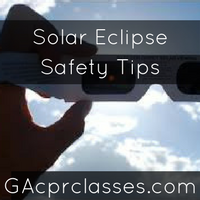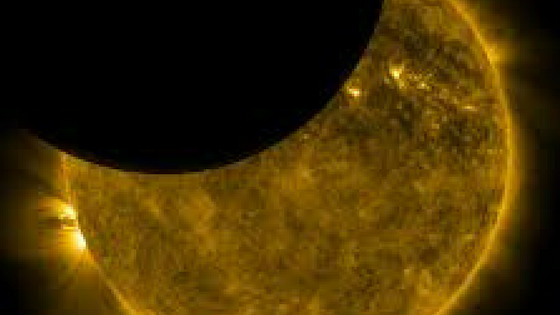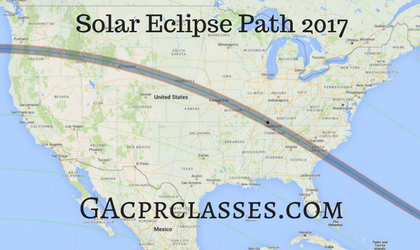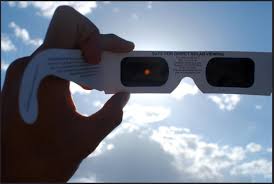Safety Tips For Solar Eclipse 2017

[adinserter block=”2″]
[adinserter block=”3″]

What Is A Solar Eclipse?
A Solar Eclipse is a celestial event that occurs when the moon passes between the sun and Earth. Eclipses are one of nature’s grandest spectacles for humans to observe. The moon can block the sun for roughly 3 hours, from beginning to end, at any given location on Earth.
2017 marks the return of a full solar eclipse to the United States for the first time in 99 years. There was a partial eclipse in 1979, but it was not visible to the majority of North America. This year’s eclipse will cover a path from Oregon to South Carolina and will stretch as wide as 70 miles. Everyone not in the path will see a partial eclipse that will dim the rest of the entire continent.

How The Eclipse Can Affect You
There are several ways the eclipse will affect you and possibly your health. Looking directly at the eclipse with no protection can seriously damage your eyes in as little 30 seconds. Our eyes work like magnifying glasses and they can focus the energy of the sunlight through the lens to actually scorch the retina. This is just like a magnifying glasses focusing the sunlight to set a piece of paper on fire, only just inside of the eye. The sunlight can cause heat damage to your inner eye that is a lot like sunburn on the inside of your eyes.

Well over 5 million people are estimated to travel for the eclipse to be close to the route of the eclipse. Along the course, viewing parties and events are scheduled throughout the day across the country. With the incoming traffic, expect delays days before, during, and after the eclipse. Certain areas may have lodging shortages, so try to plan accordingly in advance.
[adinserter block=”2″]
[adinserter block=”3″]
Safety Tips For Solar Eclipse 2017
It is never advised to look at the sun directly even outside of an eclipse. Here is our list of safety tips for watching the solar eclipse of 2017.
How to Watch The Eclipse Safely


- Wear manufactured Solar Eclipse Glasses
. Proper glasses will block out all but a thousandth of 1% of all of the light. Normal sunglasses only block about 50% of all light. The only time it is suggested to not wear the glasses is when the moon completely covers the sun, but this only lasts a few minutes before needing protection again. Always air on the side of caution and just keep the glasses on for the entirety of the eclipse.
- If you normally wear eyeglasses, keep them on. Place the eclipse glasses viewer over your normal glasses. You can also hold a handheld viewer in front of your normal glasses as well.
- Do not try to look through a telescope, binoculars, or a camera unless there’s a special solar filter over the lens.
- Keep an eye on children. They do not always wear protection properly and their eyes are extremely sensitive.
- Be careful of possible heat related issues with being outside. Be sure to wear loose and light clothes, apply plenty of sunscreen, drink lots of water, and stay out of the sun as much as possible. Call 911 for any serious heat issues like heat exhaustion, heat strokes, or heat seizures.
Authentic Solar Eclipse Glasses
Click Here To Buy ISO and CE Certified Solar Eclipse Glasses From Amazon
Traveling to Watch The Eclipse
- Be informed. Know how local officials plan to handle emergencies. Have an idea of what you would do in case of emergency as well. Do not wait to make plans on where you are staying as a lot of hotels and rentals are already booked.
- Be sure to check the weather radar on Monday to see if the weather will play a role in the day’s plans.
- Cell service may be limited due to an influx of people into the path radius. Have printed directions just in case.
- Try to arrive ahead of time to avoid any potential traffic problems.
- Keep a full tank of gas to not run out if stuck in traffic.
- Have an emergency kit in case you get stuck in traffic or without a place to stay. Supplies should be included like non-perishable food, personal hygiene items, clothes, first aid kit, water, toilet paper, among other things.
Disclaimer: There are ads and affiliate links within our posts. We earn a small commission if you do choose to use the links and they do not add any additional cost to you if you do use them. Products are recommended because they are useful and helpful, not because of the commission possibly earned. Only use the links if you believe they can help you or you are interested in learning more about an advertisement.
3 Greater Atlanta offices, online and classroom options, and cards are issued at the time you complete training. ACLS, CPR, BLS, First Aid, and PALS classes are scheduled 7 days a week.
Click here to visit our website to learn more about our CPR classes: www.GAcprclasses.com
Jobs That Need BLS Training | Jobs That Need CPR Training
[adinserter block=”2″]
[adinserter block=”3″]

